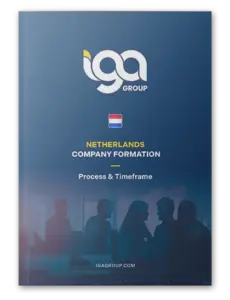Netherlands
Company Formation
The Netherlands is an attractive jurisdiction for businesses looking to establish operations within the European Union. Known for its stable political environment, competitive tax regime and modern infrastructure, the Netherlands is a preferred choice for multinational corporations, especially in sectors like technology, finance and logistics.
In addition to its role as a business hub, the Netherlands is also emerging as a key player in the regulated iGaming sector, with a reputable and transparent licensing regime.
?
Why the Netherlands
- The Netherlands is an ideal location for company formation, offering a competitive tax regime, access to EU markets and strong legal protections.
- With a low corporate tax rate for SMEs and tax exemptions on dividends and capital gains, it provides significant tax benefits.
- Its extensive network of double taxation treaties and strategic location ensure easy access to key European markets.
- The Netherlands also supports start-ups with innovation incentives, funding opportunities and a strong network of incubators, making it a prime choice for businesses of all sizes.
Key Contacts
Alexia Panzavecchia
Claire Marie Calleja Zammit
Downloads
Useful Links
Key Information Overview
| Types of Companies | Private Limited Company (BV), Public Limited Company (NV), Branch | |
| Minimum Share Capital | BV: No minimum, NV: €45,000 | |
| Registered Office | Must have a registered office in the Netherlands | |
| Shareholders & Directors | At least 1 shareholder and 1 director | |
| Bank Account | Must open a Dutch bank account and deposit share capital | |
| Tax Regime | 25.8% corporate tax, reduced rate of 19% for profits up to €200,000 | |
| Time to Complete Incorporation | 1-2 weeks | |
| Annual Maintenance Costs | Varies by company size, includes compliance and registration fees | |
| Audit Requirements | Mandatory for larger companies | |
| Market Access | Access to EU markets and strong global financial networks | |
| Key Benefits | Competitive tax regime, strong logistics and transport infrastructure | |
| Legal Framework | Based on Dutch civil law | |
| Physical Presence Requirements | Registered office required; physical presence not mandatory | |
| Corporate Governance Requirements | At least 1 director and 1 shareholder | |
| Language Requirements | Dutch, but English is commonly accepted for business documentation | |
| Tax Residency Rules | Managed and controlled from the Netherlands | |
| Required Documents | Memorandum of Association, ID proof, registered office, share capital deposit | |
| Compliance & Reporting | Annual returns, audited financial statements, VAT filings | |
| Employee and Payroll Requirements | Must comply with Dutch employment laws, including social security contributions |
Types of Companies
The Netherlands offers several company structures designed to accommodate the needs of different businesses, from start-ups to large corporations.

01
Private Limited Liability Company (BV)
- The most popular type of company, ideal for small to medium-sized enterprises (SMEs).
- Minimum share capital requirement: €0.01, making it highly flexible for start-ups.
02
Public Limited Liability Company (NV)
- Suitable for larger companies looking to raise capital through public offerings or list on a stock exchange.
- Minimum share capital requirement: €45,000.
03
Foundation (Stichting)
Typically used for charitable purposes or to manage assets, often structured without shareholders.
04
Branch of a Foreign Company
Foreign companies can establish a branch in the Netherlands to operate as an extension of the parent company.
05
Special Purpose Vehicles (SPVs)
The Netherlands is a popular jurisdiction for the formation of SPVs, commonly used for investment, securitisation, or asset-holding purposes. SPVs in the Netherlands benefit from the country’s robust legal system and favourable tax treaties.
Holding Company
The Netherlands is known for its efficient holding company regime. Companies can take advantage of the participation exemption, which allows dividends and capital gains from qualifying subsidiaries to be exempt from corporate taxes.
Securitisation Vehicle
SPVs used for securitisation benefit from a well-regulated financial system, making the Netherlands a key jurisdiction for these structures in Europe.
Investment Funds (AIFs, UCITS)
The Netherlands is a major hub for investment funds, particularly Alternative Investment Funds (AIFs) and UCITS. These vehicles benefit from EU regulations, allowing access to investors across Europe.
Stichting Administratiekantoor (STAK)
A foundation that separates economic ownership from legal ownership of shares, often used for asset protection and estate planning.
Start-Ups
The Netherlands offers several advantages for start-ups, especially in technology, fintech and innovation sectors. The country has a robust digital infrastructure and a strong start-up ecosystem, making it an ideal location for new businesses.

Tax Incentives:
- Corporate Tax Rate: The Netherlands has a corporate tax rate of 15% on profits up to €395,000 and 25.8% on profits above that threshold.
- Innovation Box Regime: Start-ups engaged in R&D can benefit from a reduced tax rate on profits generated from innovative activities.
Government Grants and Support:
- Innovation Credit: Financial support for high-risk R&D projects, with up to 35% of project costs covered.
- Seed Capital Schemes: Investment funds and loans are available for early-stage tech and innovation-driven start-ups.
Business Support:
Incubators and Accelerators: The Netherlands is home to several renowned incubators and accelerators offering mentorship, funding and networking opportunities for start-ups.
Access to Markets:
Strategic Location: The Netherlands is well-connected to Europe’s largest markets, making it an ideal gateway for expanding across the continent.
Digital Innovation:
Tech Hub: With a highly developed tech ecosystem, the Netherlands is known for its innovation in areas like AI, fintech and blockchain.
A
Grade A: Highly Start-Up Friendly
The Netherlands offers a supportive environment for start-ups, particularly in sectors like technology, fintech and digital innovation. With attractive tax incentives, government support and access to a thriving start-up ecosystem, it is an appealing destination for entrepreneurs.
Benefits
The Netherlands offers a wealth of advantages for businesses seeking a stable and tax-efficient jurisdiction within the European Union.
Favourable Tax Regime
The Netherlands has a competitive corporate tax rate, with a low rate of 15% on profits up to €395,000 and 25.8% on profits above that amount. Additionally, the participation exemption makes it ideal for holding companies.
Double Taxation Treaties
The Netherlands has an extensive network of double taxation treaties, reducing the tax burden on international income.
Strategic Location
As a gateway to Europe, the Netherlands is strategically located with excellent transport and logistics infrastructure, including major ports and airports.
Reputable Legal System
The Dutch legal system is known for its transparency and strong protections for businesses, making it a secure jurisdiction for companies.
EU Membership
As an EU member state, companies in the Netherlands have access to the EU single market, allowing the free movement of goods, services and capital.
Requirements
Incorporating a company in the Netherlands involves several key legal and administrative steps. The following are the basic requirements for forming a company.
01
Shareholders
A BV can be formed with just one shareholder. Shareholders can be individuals or corporate entities, with no restrictions on nationality or residency.
02
Directors
A minimum of one director is required for a BV. There are no residency requirements for directors, but local representation is recommended for tax residency purposes.
03
Company Secretary
There is no mandatory requirement for a company secretary in the Netherlands, though it is common practice for larger businesses
04
Registered Office
The company must have a registered office in the Netherlands, which will serve as the official address for legal communications.
05
Minimum Share Capital
A BV can be formed with a nominal share capital of €0.01, while an NV requires a minimum share capital of €45,000.
06
Bank Account
A local or international bank account must be opened in the company’s name, with the share capital deposited before incorporation.
Mergers & Acquisitions
TAILORED SUPPORT to fast-track your market entry
Our Mergers & Acquisitions services are designed to assist clients in acquiring existing companies with pre-established licenses, streamlining the process of entering or expanding in key markets. These services are particularly relevant for investors seeking to fast-track their market entry while ensuring efficient and compliant solutions.
Identifying Suitable Businesses
We help clients locate companies that meet their specific goals, focusing on entities with strong operational histories and the required licenses.
Legal and Regulatory Assistance
Our experts guide clients through the unique legal and compliance frameworks of each market, ensuring a smooth acquisition process with minimal risk.
Valuation & Due Diligence
We conduct in-depth assessments of the target company’s financial and operational status, providing transparency and confidence in the acquisition.
Post-Acquisition Support
For clients who decide to divest, we offer comprehensive services to facilitate the sale of the company and transfer of licenses.
Frequently Asked Questions
What is the corporate tax rate in the Netherlands?
The corporate tax rate in the Netherlands is 25.8%. However, profits below €200,000 are taxed at a lower rate of 19%.
Are dividends subject to withholding tax in the Netherlands?
Yes, the Netherlands imposes a 15% withholding tax on dividends, though this can be reduced under tax treaties.
What legal structures are available in the Netherlands?
Common structures include the Besloten Vennootschap (BV), a private limited company, and the Naamloze Vennootschap (NV), a public limited company.
Do companies in the Netherlands need to appoint local directors?
The Netherlands does not require local directors, but it’s advisable for tax residency purposes.
Are audited financial statements required in the Netherlands?
Larger companies are required to file audited financial statements, while smaller companies may be exempt but must still file annual reports.
Is VAT applicable to businesses in the Netherlands?
Yes, the standard VAT rate in the Netherlands is 21%, but reduced rates of 9% and 0% apply to certain goods and services.
What is the process for incorporating a company in the Netherlands?
The process involves drafting the Articles of Association, notarising them and registering with the Dutch Chamber of Commerce.
Are there any tax incentives for R&D in the Netherlands?
Yes, the Netherlands offers tax incentives for R&D through the Innovation Box regime, reducing the effective tax rate on qualifying income to 9%.
Does the Netherlands have double taxation treaties?
Yes, the Netherlands has an extensive network of double taxation treaties with over 90 countries, designed to help businesses avoid being taxed in both jurisdictions.
Are there specific tax incentives for start-ups in the Netherlands?
Yes, the Netherlands offers various incentives, such as tax breaks for innovative start-ups through the Dutch Innovation Box and other entrepreneurship support programs.
Need assistance?
Whether you have queries, need further assistance or would like to request a quote for any of our services, please don’t hesitate to contact us.
Leave your phone number and we’ll make sure to call you back.



